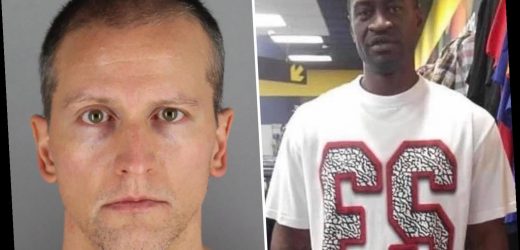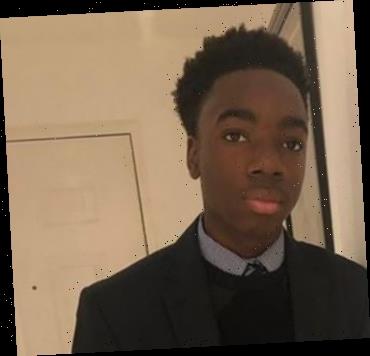THE MURDER trial of ex-Minnesota police officer Derek Chauvin, who was involved in the death of George Floyd, is set to begin.
George Floyd's death in Minneapolis saw global protests against racism and police brutality towards the black community.
Did George Floyd have a criminal history?
George Floyd, 46, was born in Fayetteville, North Carolina, and grew up in Houston, Texas.
A father of two girls and a son, the six-foot-seven "gentle giant" had been a star football and basketball player in high school.
The Houston Chronicle reports that 13 years ago, Floyd was charged with aggravated robbery with a deadly weapon – citing Harris County Court records.
He moved from his hometown to embark on a fresh start in Minneapolis where he worked as a truck driver and bouncer, say family and friends.
What was he jailed for?
In 2009, Floyd served a five-year prison sentence as part of a plea deal on the 2007 charge of aggravated robbery with a deadly weapon, reports the Houston Chronicle.
One of his Houston pals, Ronnie Lillard, told the BBC that he became involved in his local ministry, Resurrection Houston, after being freed from jail.
Determined to change himself and help improve his neighbourhood, "Big Floyd" – as he was known – "embraced his own life change [and] he was looking around at his community," Lillard added.
Floyd's ex, Roxie Washington, told reporters: "People mistake him because he was so big that they thought he was always a fighting person, but he was a loving person."
Washington – mum of one of his three kids – said that their six-year-old daughter, Gianna, was "proof that he was a good man.
She said: "I still have a picture of him waking up and getting his baby."
What did the Minneapolis police union president say about George Floyd?
Minneapolis police union head Lt Bob Kroll ranted in a letter to cops that they were being made "scapegoats" during ongoing "terrorist movement" protests against Floyd's brutal death.
He said: "What is not being told is the violent criminal history of George Floyd. The media will not air this."
Making no reference to the way in which Floyd was pinned down until he was no longer conscious, Kroll whined about the response of Mayor Jacob Frey, Minnesota Governor Tim Walz and other leaders.
Slamming them as "despicable", he complained the officials had refused to "acknowledge the work of MPD," reports the Star-Tribune.
Kroll said: "I commend you for the excellent police work you are doing in keeping your co-workers and others safe during what everyone except us refuses to call a riot.
"You've turned the tide of the largest scale riot that Minneapolis has ever seen."
Yet the Minneapolis Police Department has faced decades of allegations of brutality and other discrimination against African Americans and other minorities, even within the department itself.
Critics say its culture resists change.
The state of Minnesota has launched a civil rights investigation of the force in hopes of forcing widespread changes following Floyd's death.
The FBI is also investigating whether police wilfully deprived Floyd of his civil rights.
Governor Walz and Minnesota Human Rights Commissioner Rebecca Lucero said they want to find ways to address the department’s history of racial discrimination.
The governor said he knew that "deeply seated issues exist.
“And the reason I know it is we saw the casual nature of the erasing of George Floyd’s life and humanity."
Why was he stopped by Minneapolis police on May 25?
On May 25, “someone called 911 and reported that a man bought merchandise from Cup Foods… in Minneapolis, Hennepin County, Minnesota with a counterfeit $20 bill”, say prosecutors.
Their court report explains that, once at the scene, officers Thomas Lane and J.A. Kueng were told the customer was sitting in a car nearby.
Floyd was in the vehicle with another man and woman.
One cop “pulled his gun out and pointed it at Floyd’s open window and directed Floyd to show his hands".
After ordering him to leave the car, the officer “pulled him out of the car” and Floyd “actively resisted” being handcuffed.
Once restrained, however, Floyd was “compliant”.
Asking him if he was “on anything” the officer explained that he was arresting him for “passing counterfeit currency”, the report adds.
But, on the way to the cops' car, Floyd panicked, and said that he suffered from “claustrophobia”.
“Officers Derek Chauvin and Tou Thoa then arrived in a separate squad car.
“While standing outside the car, Mr Floyd began saying and repeating that he could not breathe,” prosecutors say.
He was pulled to the ground, “face down and still handcuffed".
Two officers held Floyd’s back and legs.
Chauvin then “placed his left knee in the area of Mr Floyd’s head and neck.
“Mr Floyd said, 'I can’t breathe' multiple times and repeatedly said, 'Mama' and 'please'."
The report says that after officers “checked Mr Floyd’s right wrist for a pulse and couldn’t find one”, he was pinned down to the ground for a further two minutes, until paramedics arrived.
He was pronounced dead that same night at Hennepin County Medical Centre.
What has happened since George Floyd's death?
Minneapolis City Council unanimously voted to pay George Floyd's family a record $27 million to settle a civil lawsuit regarding his death in police custody.
Floyd's family filed a federal civil rights lawsuit against the city of Minneapolis in July last year, that resulted in the "largest pre-trial settlement in a civil rights wrongful death case in U.S. history," their attorneys said.
They accused the officers of a "reckless disregard" of the father-of-five's civil rights by the department engaging in "warrior-style" or "killology" training.
And former officer Derek Chauvin was slapped with a third-degree murder charge.
The three other officers complicit in Floyd's death – J Alexander Keung, Tou Thao and Thomas Lane – will be tried later this year, charged with aiding and abetting murder and manslaughter.
Source: Read Full Article











